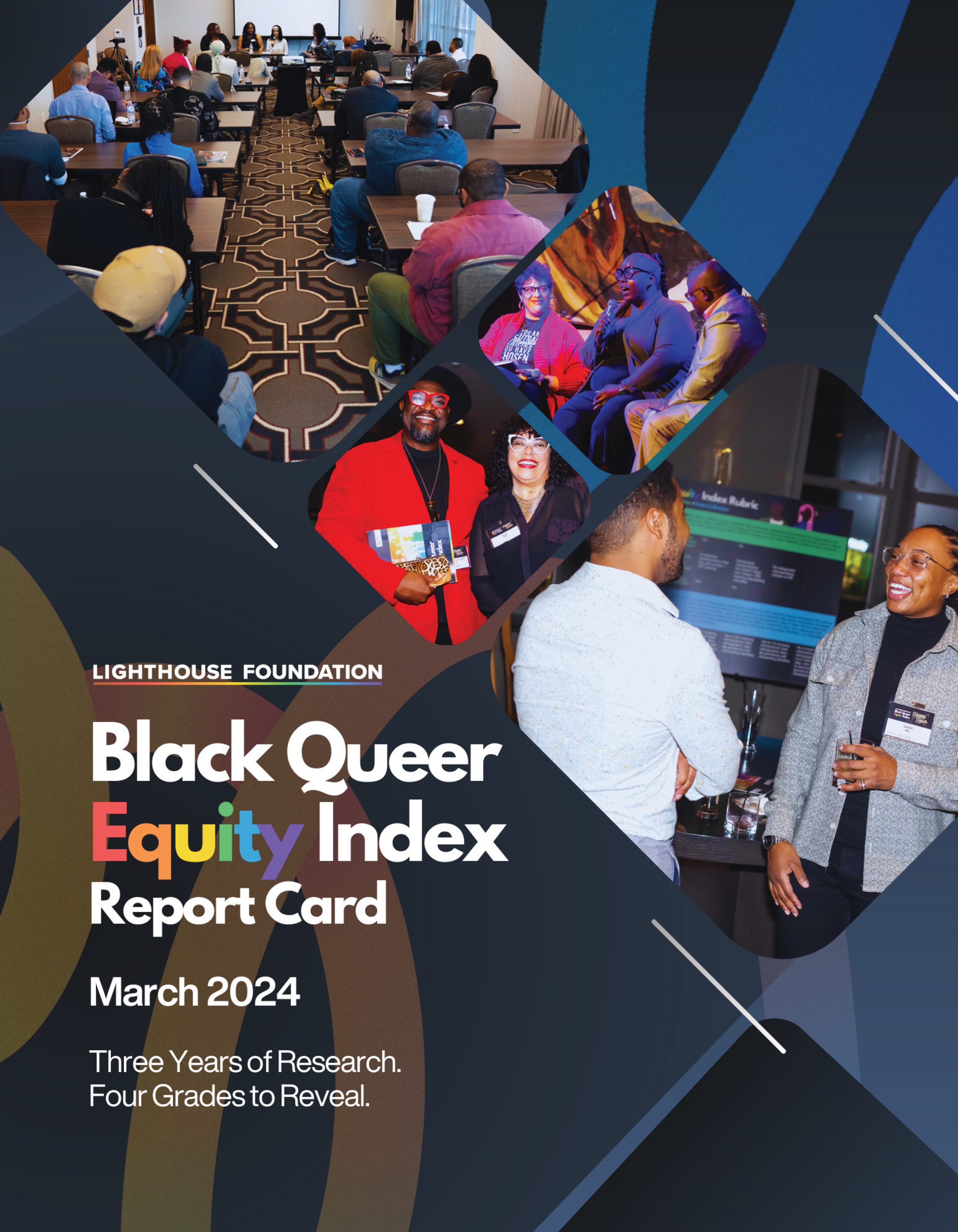
Black Queer Equity Index
Our flagship program is the Black Queer Equity Index (BQEI), a Black LGBTQ+ community-led participatory action research project to evaluate nonprofit cultures for Black LGBTQ+ staff and board members.
Join in the Work!
The BQEI offers participating nonprofits the opportunity to build relationships with other CEOs, senior leaders, and front-line staff to troubleshoot and triage situations together – both within and across organizations. By joining the BQEI, you’ll gain access to a roadmap about what equity means and what it looks like in concrete ways! You can find out more by reading Why Join the BQEI or by contacting Dr. Allen Thomas, Senior Consultant of Research and Evaluation, at bqei@lightfoundchi.org to be part of the process.
Learn More About the BQEI
Explore the Black Queer Equity Index (BQEI) and discover how it’s transforming nonprofit organizations by fostering racial and LGBTQ+ equity. In this section, you'll find resources to dive deeper into the History of the BQEI, view the latest BQEI Grades, understand the Life Cycle of the BQEI, and learn about the five core Equity Indicators. Click the links below to learn more about how BQEI is shaping inclusive and equitable workplaces for all.
What is is the BQEI?
The Black Queer Equity Index (BQEI) is a Black LGBTQ+ community-led participatory action research project that evaluates nonprofit cultures for Black LGBTQ+ staff and board members. The BQEI will improve organizational inequity by publishing an annual report card and offering actionable interventions like our Workforce Development Conference and BQEI Convenings. Lighthouse Foundation contends that when Black LGBTQ+ employees and board members are centered and empowered in their organizations, those organizations are best positioned to serve communities.
Why is the BQEI Needed?
Our research shows that 100% of Black LGBTQ+ participants at local LGBTQ+ non-profit organizations experience marginalization and urgently want the leadership to invest in improvements. To reflect the words of Trans legal scholar Dean Spade, solving the problems facing people who experience the worst levels of marginalization inevitably solves the problems of those at the top. We contend that when Black LGBTQ+ employees and board members are centered and empowered in their organizations, those organizations are best positioned to serve marginalized communities of all kinds.
Examples of core BQEI needs expressed by Black LGBTQ+ employees and board members that translate to everyone:
Bereavement Policies
Providing more expansive definitions of family - like including family of choice - honors the systems of support that marginalized employees develop outside of biological and legal relationships.
Mentorship
Creating opportunities within your organization for mentorship by people with shared lived experience helps employees and board members develop agency vital to empowerment.
What Did We Learn?
We launched the BQEI by evaluating the workplace culture of four of Chicago’s largest nonprofits addressing LGBTQ+ health – AIDS Foundation Chicago, Center on Halsted, Chicago House, and Howard Brown Health. These nonprofits work on HIV, an issue area with well-documented, pervasive, and persistent racial disparities. Actively striving to be anti-racist, they committed to working closely with us. We analyzed human resources data, surveys, interviews and focus groups to publish a BQEI White Paper in 2022.
100% of Black LGBTQ+ board members and employees reported experiencing marginalization. Frustrated by initiatives that prioritize optical diversity over the “real work” of anti-racism, they recommended many practices and policies that organizations could change.
Five key themes emerged:
Giving Voice and Power
Resource Allocation
Systemic Action
Professional Development
Data Collection
The BQEI Grades Are Here!
The 2024 Black Queer Equity Index (BQEI) grades are a culmination of meticulous evaluation and analysis conducted by Lighthouse Foundation, showcasing the performance of four notable Chicago nonprofits: AIDS Foundation Chicago, Center on Halsted, Chicago House, and Howard Brown Health. These grades are meticulously crafted based on five essential themes (listed above). They provide a detailed look into the organizations' dedication and impact, highlighting areas of strength as well as opportunities for growth and improvement.
More than just a presentation of scores, the BQEI Grades represent a celebration of progress, collaboration, and an unwavering commitment to creating inclusive and empowering workplaces for Black LGBTQ+ individuals.
These grades are a direct outcome of the BQEI rubric, which was carefully developed over three years through extensive interviews, surveys, and comprehensive research involving Black LGBTQ+ employees and board members. The rubric serves as a comprehensive report card for nonprofits, empowering them with actionable insights to foster environments where Black LGBTQ+ individuals can thrive, contribute meaningfully, and lead with authenticity and purpose.
2024 Grades Report Card
See the official grades for the inaugural cohort of BQEI organizations.
2023 Update
2021 White Paper
Details the development of BQEI and introduces the five core equity indicator themes.
Provides an update on the first two years of BQEI, revealing the rubric and key findings.












